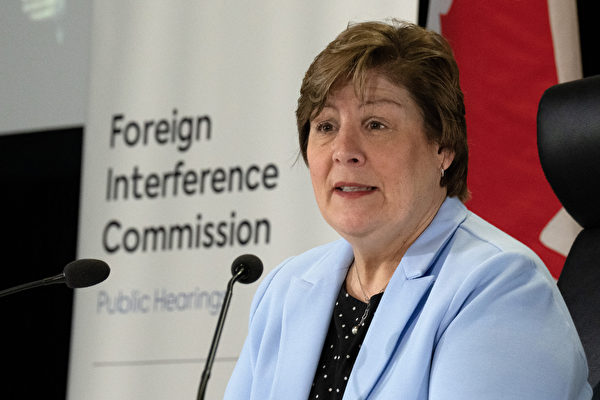On Friday, May 3rd, the Commissioner of the Canadian Foreign Interference in Elections Investigation Committee and Quebec Court of Appeal Judge, Marie-Josee Hogue, released a preliminary investigation report spanning 193 pages. Her conclusion was that there was indeed Chinese (CCP) interference in several elections, but it did not affect the overall results of the Canadian elections in 2019 and 2021.
Currently, the first phase of the investigation into foreign interference in Canadian elections has concluded. This phase primarily focused on determining whether China, Russia, and other foreign forces intervened in Canada’s recent federal elections, official information flow, and how the government responded to known information.
According to reports by the Canadian Press, Hogue pointed out that before reaching conclusions or making recommendations, there are five aspects that require further research. She stated that in the second phase of the public investigation, she needed to further investigate these five factors of foreign election interference before making an official conclusion.
One significantly discussed aspect in reports and hearings on foreign interference is how political parties conduct candidate nominations to determine candidates in each constituency and whether more supervision is needed.
Hogue cited the example of independent parliamentary member Dong Hanpeng’s nomination for the Liberal Party in 2019, indicating that this case needs further investigation in the second phase of the inquiry.
Hogue emphasized that Dong’s experience in securing the nomination clearly illustrates to what extent candidate nominations can serve as a channel for foreign interference in Canadian democracy, stating that “this must be carefully studied in the second phase of the investigation.”
The hearings also examined when the “Major Election Events Public Accord” should be activated to alert Canadians to foreign interference during elections. Some believe that the threshold for future elections should be lowered.
In her Friday report, Hogue pointed out, “Once Canadians know the impact of foreign interference, they will lose trust in our democracy.” She said that the federal government has set a high threshold for sounding the alarm to prevent foreign interference from achieving the goal of inciting and defaming democracy, which is the right thing to do.
Hogue also acknowledged that people’s concerns are valid, and they want officials to “clarify” what is happening. She said, “This contradiction is one of the issues I will study in the next phase of work.”
Hogue used Conservative Party Member of Parliament Kenny Chiu as an example. The CCP targeted the Conservative Party, resulting in Chiu’s defeat in the 2021 election. Hogue stated that more thought is needed on how the government should address false foreign information during elections.
Leading up to the election, misleading information appeared on social media and websites related to Beijing, such as WeChat, regarding Chiu and former Conservative Party leader O’Toole, categorizing them as anti-China and discouraging Canadian Chinese from voting for them.
Hogue mentioned that determining the actual impact of this activity on the final vote is “difficult.” She believes the government “needs to be very certain that it is a foreign government interfering in elections online,” but she is concerned that officials may rely too much on politicians’ public statements against false narratives and clearing the information ecosystem.
“When false information disappears, it may be too late, potentially harming the democratic process. These remarks may have disappeared before election day, but that does not mean they had no impact,” she said.
Hogue stated that investigating this is a must in the next phase of work.
One of the fourth questions Hogue wants to delve into deeper is whether national security and intelligence agencies should disclose more information about various foreign attempts or threats they are tracking than they did in the past. This involves how information about foreign interference should be communicated within the government, to the public, and to those susceptible to its influence.
Hogue’s report did not comment on how Prime Minister Trudeau and his senior aides handled the information they received and what actions they took or did not take in response.
Hogue said, “From what I have seen so far, I have not seen any evidence of malicious intent or deliberate and improper concealment of information.”
“But it does indicate that in some cases, information related to foreign interference was not given to the intended recipients, and in other cases, those receiving the information did not correctly understand it,” she said, “These are serious issues that require investigation and consideration.”
In certain high-profile interference events, only general information was apparently disclosed, “making the importance of conveying the message unclear, possibly reducing the likelihood of internalizing this important information and taking action,” Hogue said.
Finally, Hogue emphasized that Canada needs to consider more deeply how to identify the countries behind various interference attempts.
She said, “The evidence I have heard suggests that attributing election interference to foreign state behavior can be extremely challenging, especially now with the ability to use sophisticated online tools and strategies, as well as the use of proxies and collaborators.”
The next phase will raise some questions aimed at clarifying how and when federal officials can confidently point fingers and accuse another country of interference once they have sufficient evidence.

